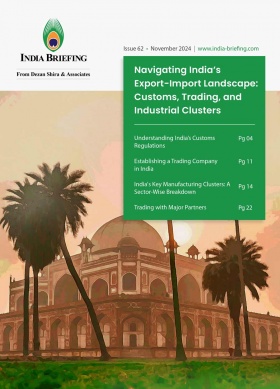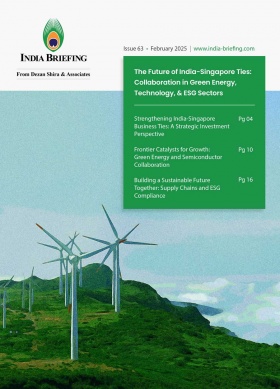India’s GST Compliance Changes from April 1, 2025: All You Need to Know
Starting April 1, 2025, India’s Goods and Services Tax (GST) compliance landscape will undergo multiple changes. This includes mandatory multi-factory authentication (MFA) for GST portal access and restrictions on E-Way Bill (EWB) generation to curb fraudulent practices. GST registered businesses should note the key requirements and dates of implementation to stay compliant.
From April 1, 2025, several key changes in India’s Goods and Services Tax (GST) compliance requirements will come into effect.
Some of the key reforms include the mandatory implementation of multi-factor authentication (MFA) for all taxpayers, stricter e-way bill (EWB) regulations, mandatory input service distributor (ISD) registration, and a lowered e-invoicing threshold to INR 1 million (US$11,698.1).
Upcoming GST compliance updates
Businesses in India will need to reassess their aggregate turnover, adopt a new invoice series, and align their operation with updated reconciliation and reverse charge mechanism (RCM) regulations. We provide a detailed overview of these upcoming changes, outlining the steps businesses need to take to remain compliant and avoid penalties.
- Mandatory Multi-Factor Authentication (MFA)
- Stricter E-Way Bill (EWB) regulations
- Mandatory ISD registration under GST framework
- Lowered e-invoicing threshold
- Implementation of new invoice series
- Reassessment of aggregate turnover
- Quarterly Return Monthly Payment (QRMP) scheme selection
- Reconciliation of Input Tax Credit (ITC)
- Reverse Charge Mechanism (RCM) compliance
- E-Way Bill Two-Factor authentication
- Letter of Undertaking (LUT) submission
- Credit Note: E-invoicing requirement effective
Mandatory Multi-Factor Authentication (MFA)
Multi-factor authentication adds an additional layer of security for accessing GST portals. All taxpayers, regardless of Annual Aggregate Turnover (AATO), must enable MFA to access the GST portal. Here’s how you can set it up.
Step 1: Click on the link to visit the GST portal: https://www.gst.gov.in/ and enter your username and password.
Step 2: After logging in, navigate to the ‘Profile’ or ‘My Profile’ section, typically found in the main menu.
Step 3: Within the ‘Profile’ section, look for an option labeled ‘2-Factor Authentication‘ or ‘security settings.’ Select this option to begin the setup process.
Step 4: India’s GST Portal offers multiple methods for receiving the One-Time Password (OTP).
- OTP via SMS: Receive the OTP on your registered mobile number.
- Sandes App: A central government-provided messaging app where you can receive OTPs. To use this, download and install the Sandes app on your registered mobile device.
- NIC-GST-Shield App: A dedicated app that generates OTPs without requiring an internet connection. Download and install this app from the GST Portal.
Step 6: Follow the on-screen instructions to complete the 2-factor authentication setup based on your chosen method.
Once enabled, each time you log in, you’ll be prompted to enter an OTP sent via your selected method, in addition to your regular username and password.
Restrictions on E-Way Bill generation
Document age restriction for E-Way Bill (EWB) generation means that when generating an EWB, the base document (such as an invoice, bill of supply, delivery challan, or credit note) used for the transportation of goods must not be older than 180 days from the date of EWB generation.
It may be noted that the total extension period for EWBs is capped at 360 days from the original generation date, preventing indefinite transit periods.
What is an E-Way Bill?
The E-Way Bill (or EWB) is a digital document required for transporting goods valued at INR 50,000 or more. It is a unique 12-digit number generated online through the GST or E-Way Bill portal. Mandatory for the movement of goods via road, rail, air, or waterways, the absence of an EWB can result in the seizure of goods and vehicles, along with a penalty of 10 percent of the goods’ value or INR 10,000, whichever is higher. Additionally, the lack of an EWB may lead to delays in the logistics and delivery process.
ISD registration mandatory under India’s GST
ISD registration is mandatory from April 1, 2025, for businesses receiving common input service invoices for multiple branches.
- It applies to all sectors, including services.
- It does not apply to goods or capital goods.
- Businesses with multiple locations must assess if ISD registration is required to ensure ITC is properly allocated.
READ: Mandatory ISD Registration Under GST Begins April 1, 2025: What Businesses Need to Know
ITC distribution formula
Formula for Allocating ITC Under ISD (Rule 39 of CGST Rules, 2017)
Explanation of terms:
- C1 = ITC distributed to a specific branch/unit.
- t1 = Turnover of the specific branch/unit.
- T = Aggregate turnover of all branches/units to which ITC is being distributed.
- C9 = Total ITC available for distribution.
Lowered e-invoicing threshold
The e-invoicing threshold will be reduced to INR 1 million (US$11,698.1), bringing more small and medium enterprises into the e-invoicing system. Businesses exceeding this turnover must upload invoices to the GST portal within 30 days of issuance to remain compliant.
Implementation of new invoice series
Businesses are advised to initiate a fresh invoice series starting April 1, 2025, for all transactional documents, including tax invoices, credit notes, debit notes, and bills of supply.
Reassessment of aggregate turnover
Businesses should reassess their aggregate turnover for FY 2024-25 to determine applicable compliance requirements for FY 2025-26, impacting decisions related to GST registration and eligibility for various schemes like Quarterly Return Monthly Payment (QRMP), e-invoicing, etc.
QRMP scheme selection
Taxpayers with an aggregate turnover up to INR 50 million (US$585,044.3) can opt into or out of the QRMP scheme, which allows for quarterly return filing with monthly tax payments. The selection for FY 2025-26 should be completed by April 30, 2025.
Reconciliation of ITC
A thorough reconciliation between the company’s financial records, including the credit and purchase register, Form GSTR-2B, and GSTR-3B, is essential to identify and rectify discrepancies. Ensuring that all eligible ITC for FY 2024-25 is claimed, ineligible credits are reversed, and mismatches are addressed to maintain compliance and accuracy in tax filings.
Reverse Charge Mechanism (RCM) compliance
Businesses must ensure that RCM invoices are prepared, taxes are discharged, and the corresponding ITC is availed in compliance with GST regulations. When a business purchases goods/services under RCM, it must:
- Issue a self-invoice (since the supplier does not charge GST).
- Mention RCM applicability on the invoice.
- Disclose RCM transactions separately in GSTR-3B.
- Pay GST on RCM through cash ledger (not ITC).
- Claim ITC on the same in the following month.
E-way bill two-factor authentication
To enhance security, all registered taxpayers are required to comply with two-factor authentication for the e-Way bill/e-Invoice system starting April 1, 2025.
Letter of Undertaking (LUT) submission
Entities involved in zero-rated supplies, such as exports or supplies to Special Economic Zones (SEZs), without paying Integrated GST (IGST), must submit a Letter of Undertaking (LUT) in Form RFD-11 for FY2025-26 by March 31, 2025.
Credit note: e-invoicing requirement
As per the latest regulatory update, e-invoicing will be mandatory for credit notes issued by registered businesses under GST starting April 1, 2025. This requirement aligns with the ongoing digitization efforts by the government to ensure seamless tax compliance and reduce discrepancies in tax reporting. Key highlights of the e-invoicing requirement for credit notes:
- Applicability:
- Businesses falling under the e-invoicing mandate must generate an Invoice Reference Number (IRN) for credit notes through the Invoice Registration Portal (IRP).
- Applies to B2B and export transactions where e-invoicing is already applicable.
- Process for issuing a credit note
- The credit note must be reported on the IRP.
- A unique IRN & QR code will be generated and must be included on the credit note.
- The e-credit note details must match the original invoice reported under e-invoicing.
Impact on businesses
Businesses must ensure that credit notes comply with e-invoicing rules to avoid non-compliance penalties. Accounting and billing systems must be updated to integrate with the e-invoicing system for seamless reporting.
Mismatches between credit notes and invoices may lead to reconciliation challenges with GST returns (GSTR-1 & GSTR-3B).
The requirement is effective from April 1, 2025, making it crucial for businesses to implement necessary changes in their billing and accounting systems before this date.
Conclusion
The upcoming changes in India’s GST compliance framework introduce critical reforms aimed at enhancing security, streamlining processes, and ensuring stricter compliance. With the mandatory implementation of MFA, stricter EWB regulations, mandatory ISD registration, and the lowered e-invoicing threshold to INR 1 million (US$11,698.1), businesses across sectors must be prepared to adapt to these changes swiftly. Additionally, requirements such as reassessing aggregate turnover, implementing a new invoice series, and ensuring compliance with reconciliation and reverse charge mechanism (RCM) regulations will necessitate proactive adjustments in business processes.
To remain compliant and avoid penalties, businesses should take immediate steps to review their current GST practices, upgrade their systems, and ensure that their accounting and billing processes align with the new guidelines. Timely compliance with these reforms will not only prevent legal repercussions but also foster smoother operations and improved efficiency in tax management.
(US$1 = INR 85.48)
(This article was originally published on December 20, 2024. It has since been updated March 31, 2025)
About Us
India Briefing is one of five regional publications under the Asia Briefing brand. It is supported by Dezan Shira & Associates, a pan-Asia, multi-disciplinary professional services firm that assists foreign investors throughout Asia, including through offices in Delhi, Mumbai, and Bengaluru in India. Dezan Shira & Associates also maintains offices or has alliance partners assisting foreign investors in China, Hong Kong SAR, Vietnam, Indonesia, Singapore, Malaysia, Mongolia, Dubai (UAE), Japan, South Korea, Nepal, The Philippines, Sri Lanka, Thailand, Italy, Germany, Bangladesh, Australia, United States, and United Kingdom and Ireland.
For a complimentary subscription to India Briefing’s content products, please click here. For support with establishing a business in India or for assistance in analyzing and entering markets, please contact the firm at india@dezshira.com or visit our website at www.dezshira.com.
- Previous Article Mandatory ISD Registration Under GST Begins April 1, 2025: What Businesses Need to Know
- Next Article India Revises Tax Audit Reporting with Form 3CD Changes Effective April 1, 2025













